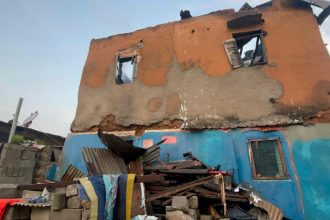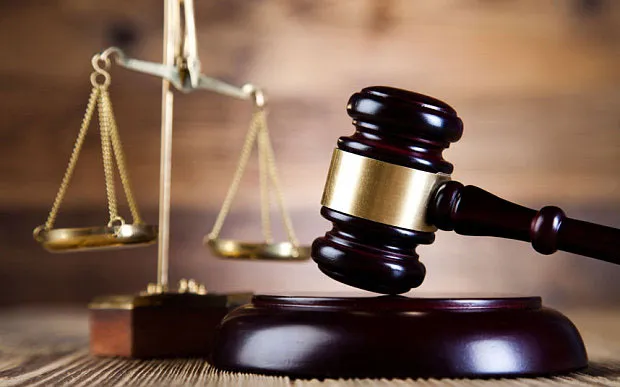The Ghana Armed Forces (GAF) has said that it would not be lenient to any culprit of illegal mining (galamsey) operating within restricted areas.
Equipment and gadgets seized from these operators would be set on fire at the site without hesitation.
This is in accordance with anti-galamseyers’ new approach of burning excavators and other equipment found at illegal mining sites.
“Any equipment found in and around water bodies and forest reserves would be destroyed,” Director Public Relations at the GAF, Colonel Aggrey-Quarshie said.
It follows a high powered military team led by the Chief of the Defence Staff, Vice Admiral S Amoama, which undertook a confirmatory reconnaissance to some locations where Operation Halt II has so far operated.
The government launched ‘Operation Halt’ in a renewed fight with the deployment of 400 military men to ensure no mining occurs within 100meters of river banks.
On Wednesday, April 28, 2021, the team commenced operations on the River Pra in the Central and Western Regions.
Over 500 pieces of equipment used in galamsey close to water bodies have been destroyed with calls for the exercise to be intensified.
An inspection by the military superiors indicated that some illegal mining activities were still in some areas that Operation Halt II had hitherto cleared.
“These illegal activities were mostly being done in the night or under the cover of darkness protected by armed guards; used cartridges were found at the sites,” Colonel Aggrey-Quarshie noted.
The Operation Halt II patrol that accompanied the team were ordered to destroy logistics found in these areas.
GAF has subsequently cautioned all citizens, especially those living in and around major rivers and their tributaries and forest reserves, that Operation Halt II was still in progress.
The military would therefore pursue their objective relentless till the galamsey menace has been tamed.
Despite an initial war waged against the galamsey menace, the illegal practice continues to threaten the environment, polluting water bodies and depleting the country’s forest reserves.
In recent times, Ghana’s cocoa sector is facing a crisis because of the ripple effects of the activities of illegal miners.
Small-scale miners fight back
Meanwhile, small-scale miners have issued a seven-day ultimatum to the government to end the destruction of their properties, or else they would respond with a demonstration.
“We are giving the government 7 days to address these concerns. If nothing is heard from them, we will embark on a three-day nationwide demonstration,” The Small-Scale Miners Association said.
Its Communications Director for the association, Abdul Razak Alhassan, explained that the military was terrorizing its operations in a press conference.
According to him, they are exempted from action by the military recently deployed to clamp down illegal mining activities because their sites are not close to river bodies.
Addressing the media at Ntaferewaso in the Twifo-Atti Morkwa District of the Central Region, he said, “ the military was deployed to specific river bodies, but we are seeing a situation where they veer into communities with licensed small-scale miners and end up burning their equipment”.
This latest action to fight the menace, popularly known as galamsey, comes after the Stakeholder Dialogue on Small Scale Mining.
Similar military deployment
Shortly after the first Akufo-Addo administration commenced in 2017, a joint military and police task force known as Operation Vanguard was unleashed to combat illegal mining.
However, the desired results were not achieved despite some successes achieved from the joint team.
After nearly three years of working together, the military component of the task force was dissolved by the government in March 2020.
It was believed that the withdrawal of the military from the joint task force was to allow restrategizing by the government in the fight against illegal mining.
The task was left in the hands of the police.
Despite their operations, there are still activities of illegal miners dotted across the country.
What necessitated the galamsey fight
Over the years, there has been growing public frustration over efforts to reclaim damaged environments.
Polluted water bodies like River Pra are still looking brownish with residues of cyanide.
Some areas of the country initially covered by thick vegetation have become bare.
The NPP government launched Operation Vanguard in 2017 to reclaim mining zones from environmental degradation caused by illegal mining.
President Nana Akufo-Addo made the fight against illegal mining one of the key objectives of his government.
“I have said it in the Cabinet, and perhaps this is the first time I am making this public, that I am prepared to put my Presidency on the line on this matter,” he said in 2017.
The government set up an Inter-Ministerial Committee on Illegal Mining (IMCIM).
A nationwide ban on small-scale mining and illegal mining, popularly known as ‘galamsey’, followed.
After four years, the government is under pressure to highlight the positives following several scandals.
There is an increasing perception that politicians are neck-deep in illegal mining and are frustrating the fight.
Even the Inter-Ministerial Committee on Illegal Mining has not been free from scandals.
Its secretary, Charles Bissue, resigned after an undercover investigation implicated him.
The Criminal Investigations Department (CID) of the Ghana Police Service concluded in their report that Mr Bissue did not circumvent laid down processes.
This was after President Akufo-Addo called for a probe into the matter following a documentary by investigative journalist Anas Aremeyaw Anas.
















